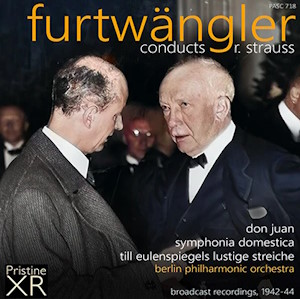
Richard Strauss (1864-1949)
Don Juan, Op. 2
Till Eulenspiegels lustige Streiche, Op.28
Symphonia domestica, Op. 53
Berlin Philharmonic Orchestra/Wilhelm Furtwängler
rec. 1942-44, Alte Philharmonie, Berlin
Pristine Audio PASC718 [75]
I included this composite recording from live performances of the Symphonia/Sinfonia domestica (it varies but the original score says “Symphonia”) in my survey of the work and quote here my verdict:
“Typically, Furtwängler interprets the music with tremendous verve and freedom, treating it as if it were a masterpiece. The sound is brittle but better than it might have been, as by this stage the Nazis were pioneering the use of magnetic tape rather than wax disc or metal cutting. There are tuning issues and much heedless coughing, which prevent it from being a recommended to the general listener other than as a historical curiosity, but the warmth and Schwung of its delivery is enough to capture both our attention and our imagination. As ever, it is remarkable to hear such music-making by Furtwängler, battling to preserve the best of German culture against a back drop of the darkest days of war. The sheer sweep, drive and propulsion of the playing are riveting and, in a way, this influences my response to every subsequent recording, as I seek the same level of commitment. Perhaps only Karajan reaches that level and not even he finds the same level of orgasmic release in the love-making music around eight minutes in to the Adagio or the exaltation of the conclusion – although of course he has the inestimable advantage of great stereo sound directed by Michel Glotz. I even like the heavy, pulsing vibrato of the solo violin – so redolent of a bygone age – and the almost hysterical abandon of the horns in the last bars. Perhaps this is only for buffs and Strauss completists – but I love it.”
I stand by every word regarding the performance but of course the big difference now is the improvement Pristine’s XR remastering into Ambient Stereo has made – and compared with my old recording on the History (Maestro Classico vol. 2) label, it now falls much more easily on the ear, with the screeching treble peaks removed and a new width and depth of sound, The whole sonic landscape has also been brought forward, too; it really is like a new recording.
Then for good measure we have two of Strauss’ shortest and most colourful tone poems. Furtwängler buffs will probably already own and understandably prefer the recordings of this pair made in the 50s in mono, which Pristine has already remastered and coupled with Strauss’ Four Last Songs. However, Furtwängler had slowed down by over a minute in both of them by that time and it may well be that some will prefer the extra verve of the earlier recordings – but they come at the expense of fairly good sound and there is no doubt that the later versions make more rewarding listening than the wartime recordings, whose acoustic is cavernous despite the Pristine clean-up.
Ralph Moore
Availability: Pristine Classical


















